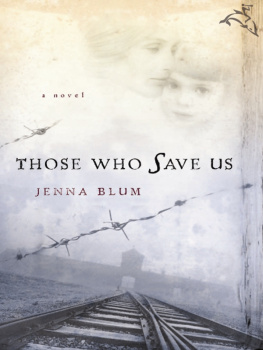THOSE WHO SAVE US
THOSE WHO SAVE US
JENNA BLUM
HARCOURT, INC .
Orlando Austin New York San Diego Toronto London
Copyright 2004 by Jenna Blum
All rights reserved. No part of this publication may be reproduced or transmitted in any form or by any means, electronic or mechanical, including photocopy, recording, or any information storage and retrieval system, without permission in writing from the publisher.
Requests for permission to make copies of any part of the work should be mailed to the following address: Permissions Department, Harcourt, Inc., 6277 Sea Harbor Drive, Orlando, Florida 32887-6777.
www.HarcourtBooks.com
Excerpts from this book have been previously published in slightly different form in the Briar Cliff Review, Meridian, and Prairie Schooner.
Library of Congress Cataloging-in-Publication Data
Blum, Jenna.
Those who save us/Jenna Blum.1st ed.
p. cm.
ISBN 0-15-101019-6
1. World War, 19391945Underground movementsFiction.
2. World War, 19391945GermanyFiction. 3. GermanyHistory19331945Fiction. 4. Holocaust, Jewish (19391945)Fiction. 5. German American womenFiction. 6. Young womenFiction.
I. Title.
PS3602.L863T47 2004
813'.54dc22 2003014777
Text set in Garamond MT
Designed by Cathy Riggs
Printed in the United States of America
First edition
A C E G I K J H F D B
This book is for my mother, Frances Joerg Blum, who took me to Germany and gave me the key:
Ich liebe Dich, meine Mutti.
And it is in beloved memory of my dad, Robert P. Blum, who would have said Mazel tov.
I had voluntarily joined the ranks of the active SS and I had becometoo fond of the black uniform to relinquish it in this way.
RUDOLF HOESS, COMMANDANT OF
AUSCHWITZ
THOSE WHO SAVE US
CONTENTS
Trudy and Anna, 1993
T HE FUNERAL IS WELL ATTENDED, THE NEW HEIDELburg Lutheran Church packed to capacity with farmers and their families who have come to bid farewell to one of their own. Since every seat is full, they also line the walls and crowd the vestibule. The men are comically unfamiliar in dark suits; they dont get this dressed up for regular services. The women, however, wear what they do every Sunday no matter what the weather, skirt-and-sweater sets with hose and pumps. Their parkas, which are puffy and incongruous and signify the imminent return to lifes practicalities, are their sole concession to the cold.
And it is cold. December in Minnesota is a bad time to have to bury a loved one, Trudy Swenson thinks. In fact, it is quite impossible. The topsoil is frozen three feet down, and her father will have to be housed in a refrigeration unit in the county morgue until the earth thaws enough to receive him. Trudy tries to steer her mind away from how Jack will look after several months in storage. She makes an attempt to instead concentrate on the eulogy. But she must be suffering the disjointed cognition of the bereaved, for her thoughts have assumed a willful life of their own. They circle above her in the nave, presenting her with an aerial view of the church and its inhabitants: Trudy herself sitting very upright in the front row next to her mother, Anna; the minister droning on about a man who, from his description, could be any fellow here; the deceased looking dead in his casket; the rest of the town seated behind Trudy, staring at the back of her head. Trudy feels horribly conspicuous, and although she means her father no disrespect, she prays only for the service to be over.
Then it is, and the congregation rumbles to its feet and stands in expectation. Trudy realizes that they are waiting for her and Anna to depart the church ahead of everyone else, as is proper. She pauses to mumble a final good-bye to Jack; then she takes Annas elbow to help her from the pew. Anna allows Trudy to guide her past the ranks of impassive faces, but once they are outside she folds her arms to her sides and forges on alone. The two women take tiny cautious steps over the ice to Trudys car.
Trudy starts the ignition and sits shivering, waiting for the engine to warm up. The interior of the Civic wont be comfortable until they have reached their destination, the farmhouse six miles north of here. The arctic air is like shards of glass in the lungs; it shakes Trudy to the bones until they threaten to snap.
Well, I thought that was a nice service, she says to Anna.
Anna is looking through the passengers window at the horizon. The Lutheran Church is built on the highest ridge in New Heidelburg, all the better to be close to God. From this vantage point in the summer, the countryside below is a dreaming checkerboard over which it seems that one could, with a running start, spread ones arms and fly. Now it is a sullen and unbroken white.
Trudy tries again.
Short and simple, she says. Dad would have approved, dont you think?
Slowly, Anna turns her pale gaze on the windshield and then upon her daughter, staring at Trudy as though she doesnt know who Trudy is.
We must get to the house, she replies. I must set out the food. The people will be coming soon enough.
This is true; all around them, the New Heidelburgers are already climbing into their trucks and minivans. After a brief and respectful intermission to let the family members refresh their public faces, the townsfolk will descend upon the farmhouse, bearing casseroles and condolences. Trudy shifts into gear and accelerates out of the lot, noting Annas hands and feet jerk up, just a little, at the unaccustomed speed. Although Anna has lived nearly fifty years in this remote rural area, where people think nothing of traveling half an hour to buy groceries, she has never learned to drive. She turns back to her window to watch the fields as they blur past.
To Trudy, who abandoned New Heidelburg for the Twin Cities as soon as she finished high school thirty-five years earlier, this landscape is a study in monotony, as bleak and inhospitable as the steppes of Siberia. Snow and mud, gray sky, line after line of barbed-wire fencing swooping along the two-lane road. Silos and trailers. Even the cows are nowhere to be seen. It is early yet, three oclock, but night comes quickly in this part of the country; it will be full dark in an hour. The knowledge of this, and how she will spend that time, makes Trudy feel desperate to be in her own kitchen, her study, in her classroom lecturing disenchanted students, anywhere but here. She suddenly decides she will return to Minneapolis sooner than planned, perhaps tomorrow morning. For one of the odd things about death, Trudy has discovered, is that in its wake one must go about business as usual; it seems heartless and wrong, but now that the rituals of mourning have been attended to, the sole task left to Trudy is to try and comprehend the enormity of this sudden change. And this she might as well do in the comfort of her home rather than sitting in silence with Anna.
First, however, there is the reception to be endured, so Trudy pulls into the farmhouse drive. As they pass through the windbreak of pines, fingers of sun pierce the clouds, transforming the spindrift in the fields into glittering sheets and highlighting the outbuildings in what seems to Trudy a shamelessly dramatic, ecclesiastical way. She parks and helps Anna from the car but paces around the dooryard long after Anna has gone inside. It is here, reportedly, that Jack had his fatal heart attack; the coroner has assured Trudy that Jack was dead before he hit the ground. Yet Trudy wonders: Did Jack pause, bewildered by the pain ripping through his left arm, his chest? Did he have time to realize what was happening to him? Trudy hopes not; it would ease her mind to know for certain, but Anna, the only witness, is as usual not talking. Trudy spends another minute peering at the tamped-down snow, trying to discern beneath it the path Jack followed so consistently from barn to porch that his boots wore ruts in the grass. But she can see nothing, and the sun fades behind a gauzy cataract of cloud, and finally Trudy sighs and climbs the steps into her mothers house.
Next page










